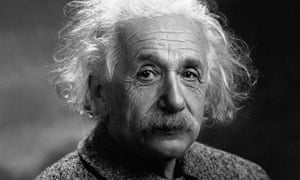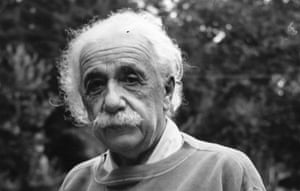
1. His science
Einstein was, first and foremost, a scientist. In 1905 and again in 1916, heradically revised our understanding of the universe. He was a pictorial thinker who came up with a new, intuitive sense of what reality looked like. Physics at the start of the 20th century was a rather settled endeavour, not seemingly in need of radical revision. We thought light was a wave and that duration, length and mass were objective facts of the world. We thought that space was a flat, Euclidean entity, unaffected by the distribution of matter and energy within it. Einstein, a mere patent clerk when he first began suggesting differently, showed us that light must be thought of as a particle when it is emitted or absorbed, that matter is composed of atoms, that space is malleable, undulating with the distribution of the stuff within it, that how long or massive an object is or the time order of closely occurring events is not a fact of the world, but merely a fact of our point of view. He showed that these perspectival truths were well-behaved when they were placed in a four-dimensional conceptual framework. Seeing may be believing, but what we should believe about the universe, Einstein demonstrated, requires seeing it from a reference frame beyond that of the human senses.
2. His politics
Einstein joked to his dear friend Max Born that he had a version of the Midas touch: everything he said turned to newsprint. Einstein’s science made him a worldwide celebrity, a status others might have enjoyed, but which Einstein despised. He was no shrinking violet, yet he detested the shallowness and meaningless absurdity that came with his universal adoration. But he realised that it could be handy. He was given a cultural megaphone and he decided that its best use was to amplify the concerns of those whose voices were least heard. Whether it was his own Jewish brethren suffering the insults of antisemitism, African-Americans suffering systematic racism, the poor kept down by structural barriers to advancement, or political dissidents in the Soviet Union who were being repressed, Einstein was unabashedly vocal in trying to change the institutions that led to inequality and injustice. His standing provided him with a unique place to speak for those who were silenced and he made great use of it in the name of universal human dignity.
3. His immodesty
Einstein never lacked confidence. Strengthened by his convictions, he was impervious to the power of those with superior social or professional standing, and resolute in his willingness to state his beliefs publicly. As social psychologists have shown since the famous experiments of Solomon Asch and Stanley Milgram, humans are greatly influenced by the opinions of those around us, especially those who occupy positions of authority. We can shy away from reasonable and ethical beliefs, if we sense that we are in the minority for holding those views. But Einstein stands as an example of intellectual commitment. His revolutionary physical theories and his advocacy for peace at times of war and for better treatment of those in need were often unpopular. Einstein was investigated by the FBI for his views, and he received death threats from Nazi sympathisers. He was threatened with the loss of his position at the Institute for Advanced Studyfor his vocal support for his beliefs and causes. Yet he steadfastly refused to give in to fashion, expedience or groupthink. It is a cliche to say someone has the “courage of his convictions”, but Einstein is a figure of great courage in publicly expounding views he thought correct and morally necessary when such positions were dangerously unpopular.
4. His modesty
Einstein was flummoxed by his public reception. In one famous incident, he was accompanying Charlie Chaplin to the opening of his film City Lights when they were mobbed by thousands of fans. “What does it mean?” Einstein asked Chaplin, who replied: “Nothing.” We have a cognitive bias that leads us to be more apt to believe the praise we receive and to explain away criticism. We are the focus of our lives and with the contemporary cults of individuality and celebrity, too many people eagerly welcome the spotlight and take it as a sign of their superiority. But Einstein did not seek mass adoration or personal aggrandisement. He was not present to receive his Nobel prize. He refused the presidency of Israel. He was willing to step into the public eye when it suited his causes, but he was not one to seek fame for the sake of fame.
5. His meaning as a cultural symbol of modernity
I often ask audiences: “When I say the name Albert Einstein, what is the first thing that comes to mind?” Regardless of the demographic or the country in which I ask this, inevitably the response is “the hair”. Here is a man who changed the way the way we see reality, who stared down hatred and stood up for justice, yet despite all of this, the thing we immediately think of is that mane of unkempt, wild white hair. That may seem shallow of us, but I think it is a good thing. What does Einstein’s hair signify? It was a political statement – he refused to conform to social standards of personal appearance. He was unapologetic in his individuality and unashamed of being different. Growing up a Jew in Wilhelmine Germany, where he was sent to a Catholic school, he was always aware of being an outsider and became not only comfortable with his distance from the mainstream, but took it as a mark of pride. On the one hand, Einstein is the very icon of the genius, someone whose innate intelligence made him radically unlike the masses. But in allowing his hair to become the spectacle it was, he became a symbol that said that special people can come from anywhere, can look like anyone. His physics appeared at a time when the regular order was being challenged by modernist movements in mathematics, science, art, religion, governmental and economic structures, even the very sense of what it was to be a human was being reconsidered from its core. Einstein, with his wild hair, signalled that human advancement comes not from the conformity the authorities demand, but from difference – and that all of us at various times in our lives feel a sense of alienation. Einstein gives us pride in ourselves as individuals who can make a difference; we can revel in free thought, but there is no need in doing so to reject our shared humanity.
• Steven Gimbel’s Einstein: His Space and Times is published by Yale. To order a copy for £14.99, go to bookshop.theguardian.com or call 0330 333 6846. Free UK p&p over £10, online orders only. Phone orders min. p&p of £1.99.















0 comments:
Post a Comment